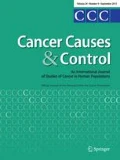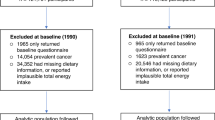Data from a multicenter case-control study on breast cancer conducted in Italy have been used to analyze the relationship of olive oil and other dietary fats to breast cancer risk. Cases were 2,564 women hospitalized with histologically confirmed, incident breast cancer. Controls were 2,588 women admitted to the same network of hospitals for acute, non-neoplastic, non-hormone related, on-digestive tract disorders. Cases and controls were interviewed between 1991 and 1994 using a validated food-frequency questionnaire. The data were modelled through multiple logistic regression controlling for demographic and reproductive breast-cancer risk factors, energy intake and, mutually, for types of dietary fat. For olive oil, compared with the lowest quintile, the odds ratios (OR) were 1.05, 0.99, 0.93, and 0.87 for increasing quintiles of intake; in a model postulating linear logit increase, the OR per unit (30g) was 0.89 (95 percent confidence interval [CI]=0.81–0.99, P=0.03). Among other oils or fats considered, the OR for the highest level of intake was 0.72 (CI=0.6–0.9) for a group of specific seed oils (including safflower, maize, peanut, and soya) compared with nonusers. The ORs for the highest cf lowest level of intake were 0.80 for mixed or unspecified seed oils, 0.95 for butter, and 0.96 for margarine. The study, based on a large dataset from various Italian regions, shows an inverse relationship of breast cancer risk with intake of olive oil and other vegetable oils, but not with butter or margarine.
Similar content being viewed by others
References
Levi F, Lucchini F, La Vecchia C. Worldwide patterns of cancer mortality, 1985–9. Eur J Cancer Prev 1994; 3: 109–43.
Giacosa A, Hill MJ, eds. The Mediterranean Diet and Cancer Prevention. Proceedings of a workshop organized by the European Cancer Prevention Organization (ECP) and the Italian League against Cancer, Cosenza, Italy, June 28–30, 1991. Andover, England (UK): European Cancer Prevention Organization, 1991.
Hill M, Giacosa A. The Mediterranean diet (Editorial). Eur J Cancer Prev 1992; 1: 339–40.
Cohen LA, Thompson DO, Choi K, Karmali RA, Rose DP. Dietary fat and mammary cancer. II. Modulation of serum and tumor lipid composition and tumor prostaglandins by different dietary fats: Association with tumor incidence patterns. JNCI 1986; 77: 43–51.
Lasekan JB, Clayton MK, Gendron-Fitzpatrick A, Ney DM. Dietary olive and safflower oils in promotion of DMBA-induced mammary tumorigenesis in rats. Nutr Cancer 1990; 13: 153–63.
Toniolo P, Riboli E, Protta F, Charrel M, Cappa APM. Calorie-providing nutrients and risk of breast cancer. JNCI 1989; 81: 278–86.
Martin-Moreno JM, Willett WC, Gorgojo L, et al. Dietary fat, olive oil intake and breast cancer risk. Int J Cancer 1994; 58: 774–80.
Trichopoulou A, Katsouyanni K, Stuver S, et al. Consumption of olive oil and specific food groups in relation to breast cancer risk in Greece. JNCI 1995; 87: 110–6.
Landa MC, Frago N, Tres A. Diet and risk of breast cancer in Spain. Eur J Cancer Prev 1994; 3: 313–20.
La Vecchia C, Negri E, Franceschi S, et al. Hormone replacement treatment and breast cancer risk: a cooperative Italian study. Br J Cancer 1995; 72: 244–8.
Franceschi S, Negri E, Salvini S, et al. Reproducibility of an Italian food frequency questionnaire for cancer studies: Results for specific food items. Eur J Cancer 1993; 29A: 2298–305.
Breslow NE, Day NE. Statistical Methods in Cancer Research. Vol I. The Analysis of Case-control Studies. Lyon, France: International Agency for Research on Cancer, 1980; IARC Sci. Pub. No. 32.
Willett WC, Stampfer MJ. Total energy intake: implications for epidemiologic analyses. Am J Epidemiol 1986; 124: 17–27.
D'Avanzo B, Negri E, Gramenzi A, et al. Fats in seasoning and breast cancer risk: an Italian case-control study. Eur J Cancer 1991; 27: 420–3.
Mantel N, Haenszel W. Statistical aspects of the analysis of data from retrospective studies of disease. JNCI 1959; 22: 719–48.
Hunter DJ, Willett WC. Diet, body build, and breast cancer. Annu Rev Nutr 1994; 14: 393–418.
Lipworth L. Epidemiology of breast cancer (Review). Eur J Cancer Prev 1995; 4: 7–30.
Holmes MD, Hunter DJ, Willett WC. Dietary guidelines. In: Stoll BA, ed. Reducing Breast Cancer Risk in Women. Boston, MA (USA): Kluwer Academic Publishers, 1995: 135–44.
Author information
Authors and Affiliations
Rights and permissions
About this article
Cite this article
La Vecchia, C., Negri, E., Franceschi, S. et al. Olive oil, other dietary fats, and the risk of breast cancer (Italy). Cancer Causes Control 6, 545–550 (1995). https://doi.org/10.1007/BF00054164
Received:
Accepted:
Issue Date:
DOI: https://doi.org/10.1007/BF00054164




